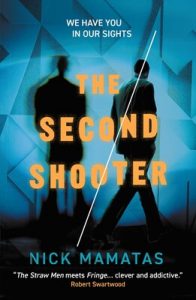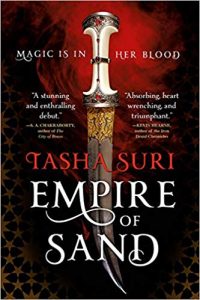Ian Mond Reviews The Second Shooter by Nick Mamatas
 The Second Shooter, Nick Mamatas (Solaris 978-1-78108-926-2, $14.00, 400pp, tp) November 2021.
The Second Shooter, Nick Mamatas (Solaris 978-1-78108-926-2, $14.00, 400pp, tp) November 2021.
Having skewered everything from late-stage capitalism to America’s political and cultural malaise in his last novel, Sabbath, Nick Mamatas boldly turns his attention to the intractable issue of gun violence and mass shootings with his highly entertaining follow-up, The Second Shooter.
The story centres on journalist and hack-for-hire Mike Karras as he travels across America to research a new book about the “second shooter” phenomenon. It’s a theory, held by true believers and “eyewitnesses who wouldn’t recant, despite the facts and evidence,” that most mass shootings involve a second gunman. As Karras points out, “there is almost never an actual second shooter. The fog and night of war in the microcosm explained nearly every sighting.” However, for Karras’s publisher Little Round Books, it’s precisely the sort of middle ground “gonzo” – not too toxic, not too far-right – that will play to their baby-boomer readership like “Auntie Becky and her church group.”
When we meet Karras, he’s spent three months on the road interviewing people adamant they’ve witnessed a second shooter. Karras doesn’t believe any of it, but he knows that kooky claims, such as those of ex-cop Lurlene Grutzmacher, who says her second shooter looked like “the heat shimmer over the grill,” will make good fodder for his book. He expects the same from Rahel Alazar, who reaches out to Karras about her encounter with a second shooter during a massacre at her local Church. Karras, however, is so struck by Rahel’s honesty, her courage, and, yes, her beauty that he doesn’t immediately dismiss her account. It’s while spending time with Rahel and the Alazar family that Karras’s life takes a turn for the weird. He becomes a target for the rabid fans of conspiracy theorist Chris Bennett (a poor man’s Alex Jones), is followed by a preponderance of drones, discovers his computer and phone and that of his publisher have been hacked, and finds himself discussing French Marxist theory over Skype with an active shooter.
The Second Shooter, in terms of its tone and style, is heavily influenced by Mamatas’s long-standing love for crime and pulp fiction. He nails the jaded interior voice of Mike Karras, the world-weary, I’ve-seen-it-all cynic who has built his career on the mantra that “people want to talk.” Rather unsurprisingly, Karras is not a likeable person: untrustworthy, smug and sleazy, his lusting over Rahel (“She was perspiring from the weather and exertion and, likely, her temper. Karras wanted to lick her face clean”) a particular lowlight. But we do get snippets of Karras’s childhood that somewhat humanise him, and spending time with the journalist is never dull, whether he’s sparring with Chris Bennett over “false flag” operations, or trying to ingratiate himself with the Alazar family, or debating the merits of “The Spectacle” with a shooter who has just gone postal on his office colleagues. It also helps that Karras’s wretchedness is contrasted with a lively cast of characters, some of whom are more objectionable than the journalist (such as Bennett), but also the principled and courageous Rahel and the enigmatic editor of Little Round Books’s Sharon Toynbee.
The pulpish flavour of The Second Shooter means it’s a great deal of fun to read. I realise it’s odd to describe a novel about mass shootings as “fun,” and to be clear, Mamatas never diminishes or downplays either the frequency or visceral horror of gun violence, but via Karras, he does take the piss out of the theatrics that surrounds the discussion over guns in America. Much of the focus is on the right-wing fringe and their hideous and unfounded belief that all mass shootings are false flag operations featuring crisis actors. As Karras says, “according to Bennett, there has never been a school shooting, just a perennial touring production of a stage show called ‘The Latest Uniquely American Tragedy.”’ But Mamatas also satirises the merry-go-round that masquerades as “debate” about the Second Amendment in America. At one point, there’s a protest march against gun ownership led by the teenage survivors of a school shooting, akin to Sandy Hook (although, horribly, I could have chosen any number of real-world examples). While it initially gains public attention, fuelled by a catchy chant – “This is the emergency!” – the movement soon fizzles out when a demonstration in front of a gun shop ends with a group of heavily armed men hugging the survivors. “Two other men repositioned their rifles and hugged one Middlesex survivor after another, while other sympathisers repositioned themselves to get close-ups.” It’s a darkly funny, even moving scene, but one that sadly acknowledges that no amount of protests and chants will solve the problem of mass shootings in America.
Mamatas, however, isn’t satisfied with just satirising the country’s rabid devotion to the Second Amendment. About two-thirds of the way through, The Second Shooter takes an unexpected swerve toward the fantastic. I won’t say how, but I’m going to wager this is the first genre novel where the plot rests on Guy Debord’s 1967 work The Society of the Spectacle. While I’m not familiar with this branch of French Marxist philosophy, I loved how cleverly Mamatas weaves the idea of breaking free of the “autocratic reign of the market economy” into the narrative without it seeming pretentious or ridiculous (well, it’s a little bit silly, but in a good way). Then again, it’s this level of inventiveness, laced with a mordant sense of humour and a recognition of the deep fissures that run through American society, that I’ve come to expect from Mamatas’s fiction.
Ian Mond loves to talk about books. For eight years he co-hosted a book podcast, The Writer and the Critic, with Kirstyn McDermott. Recently he has revived his blog, The Hysterical Hamster, and is again posting mostly vulgar reviews on an eclectic range of literary and genre novels. You can also follow Ian on Twitter (@Mondyboy) or contact him at mondyboy74@gmail.com.
This review and more like it in the November 2021 issue of Locus.
 While you are here, please take a moment to support Locus with a one-time or recurring donation. We rely on reader donations to keep the magazine and site going, and would like to keep the site paywall free, but WE NEED YOUR FINANCIAL SUPPORT to continue quality coverage of the science fiction and fantasy field.
While you are here, please take a moment to support Locus with a one-time or recurring donation. We rely on reader donations to keep the magazine and site going, and would like to keep the site paywall free, but WE NEED YOUR FINANCIAL SUPPORT to continue quality coverage of the science fiction and fantasy field.
©Locus Magazine. Copyrighted material may not be republished without permission of LSFF.






